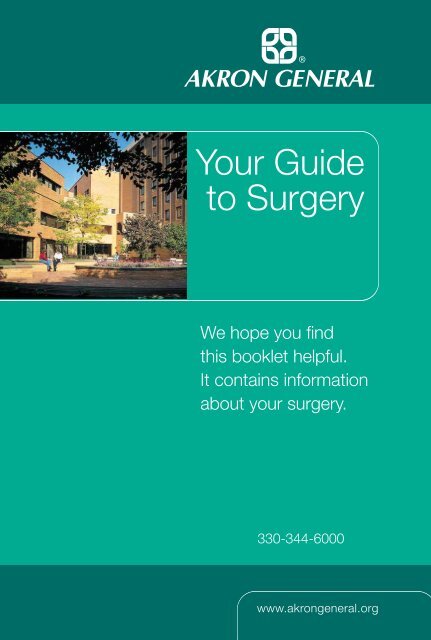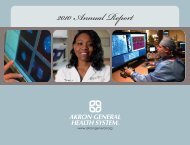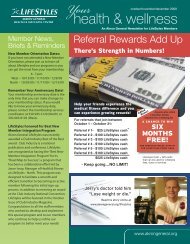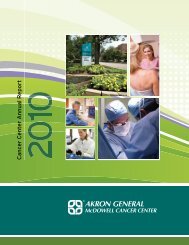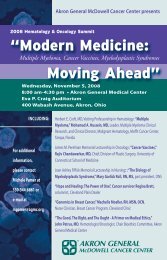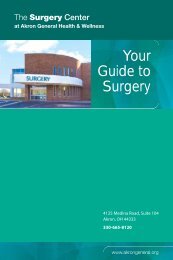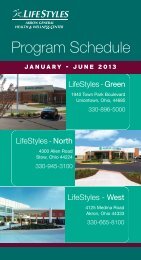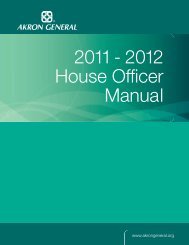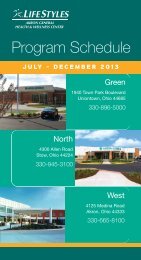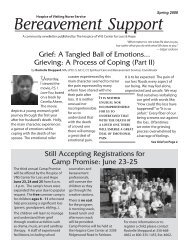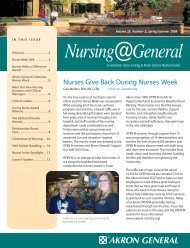Your Guide to Surgery - Akron General Medical Center
Your Guide to Surgery - Akron General Medical Center
Your Guide to Surgery - Akron General Medical Center
Create successful ePaper yourself
Turn your PDF publications into a flip-book with our unique Google optimized e-Paper software.
<strong>Your</strong> <strong>Guide</strong><br />
<strong>to</strong> <strong>Surgery</strong><br />
We hope you find<br />
this booklet helpful.<br />
It contains information<br />
about your surgery.<br />
330-344-6000<br />
www.akrongeneral.org
Welcome<br />
Welcome <strong>to</strong> <strong>Akron</strong> <strong>General</strong> <strong>Medical</strong> <strong>Center</strong>. We are so pleased you<br />
chose us for your healthcare needs.<br />
We hope you find this booklet helpful. The pages that follow contain<br />
important information about your surgery, as well as specific home<br />
care instructions. If you have a particular need, please mention it <strong>to</strong><br />
your nurse or bring it <strong>to</strong> the attention of our Patient Advocate by<br />
calling 330-344-6711.<br />
We hope your experience here is a pleasant<br />
one, and will do everything <strong>to</strong> make your<br />
stay as comfortable as possible.<br />
On behalf of <strong>Akron</strong> <strong>General</strong>, I wish you a<br />
speedy recovery.<br />
Sincerely,<br />
Vincent J. McCorkle<br />
President & CEO<br />
<strong>Akron</strong> <strong>General</strong> Health System
NAME:<br />
INSTRUCTIONS FOR SURGERY<br />
• Please arrive at <strong>Akron</strong> <strong>General</strong> <strong>Medical</strong> <strong>Center</strong> on:<br />
Date: _________________ at time __________________ am/pm.<br />
• Please park in the parking deck across the street from the Main<br />
Entrance.<br />
• You need <strong>to</strong> enter through the main entrance hospital and report <strong>to</strong> the<br />
Surgical Welcome <strong>Center</strong>.<br />
• Do NOT eat or drink after midnight before your surgery. No mints or<br />
gum, please.<br />
• Continue <strong>to</strong> take all your scheduled medications as instructed with<br />
a sip of water. If you have any question please ask your physician for<br />
additional instructions.<br />
• Do not wear make-up or nail polish. All jewelry including wedding bands<br />
and piercings MUST be removed. No wigs, hairpins, glasses, contact<br />
lenses, false eyelashes, dentures or partial plate in the operating room.<br />
• Please leave all valuables including credit cards, money, and cell phones<br />
at home.<br />
• If you use inhalers, please bring them with you on the day of surgery.<br />
• If you use a CPAP or BIPAP machine, please bring it with you the day<br />
of surgery.<br />
• Bring your glasses or glass case<br />
• Dress in casual, comfortable clothing.<br />
• Do not wear cologne, perfume, deodorant or skin lotions.<br />
• All females with childbearing potential will be required <strong>to</strong> bring the first<br />
voided urine on the day of surgery for pregnancy testing. A urine cup<br />
will be provided <strong>to</strong> you by your doc<strong>to</strong>r’s office or Pre-Surgical Testing<br />
Department or you may use a clean, leak-proof jar, labeled with your<br />
name. Bring the container of urine with you <strong>to</strong> the pre-surgical unit on<br />
the day of surgery.<br />
• Please let your surgeon know if you develop any cold or flu symp<strong>to</strong>ms<br />
or have any change in the area where you are having surgery,<br />
(ie. rashes, scratches, pimples, injuries, or breaks in the skin). DO NOT<br />
SHAVE THE OPERATIVE SITE.<br />
• FOR YOUR PERSONAL SAFETY- YOU WILL NOT BE ALLOWED TO<br />
DRIVE OR TAKE A TAXI HOME ALONE. Please make arrangements<br />
for someone <strong>to</strong> drive or accompany you home in a taxi.<br />
• For those patients being admitted <strong>to</strong> the hospital, PLEASE LEAVE ALL<br />
SUITCASES AND YOUR PERSONAL BELONGINGS IN YOUR CAR.<br />
Family may bring the items <strong>to</strong> your room after you are admitted.
Name: _________________________________________________________________<br />
<br />
You have a Pre-Surgical testing appointment for<br />
Date:___________ Day:__________ Time:_________a.m./p.m<br />
Report <strong>to</strong> the first floor of the Ambula<strong>to</strong>ry Care <strong>Center</strong>. Address 301<br />
Wabash Ave. Park in the deck adjacent <strong>to</strong> the building and check in<br />
with the Pre-Surgical Testing Department. Please arrive 15 minutes<br />
prior <strong>to</strong> your appointment.<br />
<br />
<strong>Your</strong> <strong>Surgery</strong> is scheduled for<br />
Date:___________ Day:__________ Est. Time:_________a.m./p.m<br />
Please arrive at _____________a.m./p.m<br />
Please plan <strong>to</strong> arrive no later than 2 hours prior <strong>to</strong> your surgery,<br />
unless otherwise instructed. This allows time for you <strong>to</strong> speak <strong>to</strong> an<br />
anesthesiologist, have lab tests completed, be prepared for surgery<br />
and get comfortable. You may have one visi<strong>to</strong>r accompany you <strong>to</strong> the<br />
Pre-Surgical Unit on the day of your surgery.<br />
If you are unable <strong>to</strong> have your surgery or pre-testing on the day<br />
scheduled, notify your doc<strong>to</strong>r <strong>to</strong> be rescheduled.<br />
Important phone numbers<br />
<strong>Akron</strong> <strong>General</strong> Chart<br />
Command Central<br />
M - F 8 a.m. <strong>to</strong> 5 p.m.<br />
330-344-7845<br />
<strong>Akron</strong> <strong>General</strong> Pre-Surgical<br />
Testing Department<br />
M - F 8 a.m. <strong>to</strong> 4:30 p.m.<br />
330-344-7776<br />
<strong>Akron</strong> <strong>General</strong> <strong>Surgery</strong><br />
Welcome <strong>Center</strong><br />
330-344-6466<br />
<strong>Akron</strong> <strong>General</strong> Pre-Surgical Unit<br />
330-344-6436<br />
<strong>Akron</strong> <strong>General</strong> Patient<br />
Financial Services<br />
M - Th 8:30 a.m. <strong>to</strong> 7 p.m. and<br />
F 8:30 a.m. <strong>to</strong> 5 p.m.<br />
330-344-2000<br />
They are able <strong>to</strong> answer your questions<br />
about insurance coverage, Medicare<br />
and other financial concerns.<br />
1
Before your surgery<br />
Registering<br />
You may register for your surgery two ways:<br />
Call registration, 330-344-6152. If you have <strong>to</strong> leave a message, include<br />
your name, date of surgery, telephone number and a convenient time <strong>to</strong><br />
contact you. An <strong>Akron</strong> <strong>General</strong> Representative will return your call.<br />
Wait for an <strong>Akron</strong> <strong>General</strong> Representative <strong>to</strong> call you <strong>to</strong> complete<br />
registration over the phone.<br />
Pre-admission testing<br />
Within 30 days of your surgery, your surgeon may require you <strong>to</strong> under go<br />
certain tests, and have a physical. You will also meet with a registered nurse<br />
who will give you the latest information concerning your instructions before<br />
your surgery. This appointment should last no longer than 90 minutes.<br />
All patients will receive a phone call from a registered nurse prior <strong>to</strong> your<br />
Pre-Admission testing appointment/surgery. Please have available your<br />
health his<strong>to</strong>ry information, a list of all your current medications (including<br />
non-prescription and herbal therapies) dosages, a reason for usage and any<br />
allergies. This phone call will last approximately 15 minutes. If you receive a<br />
message, please return the call <strong>to</strong> 330-344-7845. If you are asked <strong>to</strong> leave<br />
a message, please provide a phone number and a time that is convenient<br />
for us <strong>to</strong> reach you. The office hours are Monday – Friday 8 a.m. – 5 p.m.<br />
On the day of your appointment you may eat and drink as normal. Please<br />
bring any papers your surgeon gave you along with your insurance cards<br />
and a copy of your advance directive, if appropriate. Please see page 12<br />
for more information on Advance Directives.<br />
OUR MISSION & VALUES<br />
Our Mission is <strong>to</strong> improve the health and lives of our patients<br />
and community.<br />
Our Values are Patients First, Leadership, Quality, Financially<br />
Sound, Integrity, Caring<br />
2
Preparing for your surgery<br />
<strong>Your</strong> doc<strong>to</strong>r may have given you specific instructions <strong>to</strong> be followed prior <strong>to</strong><br />
your surgery. NOTIFY YOUR SURGEON IF YOU ARE TAKING ASPIRIN,<br />
BLOOD THINNERS OR ARTHRITIC MEDICATION DAILY.<br />
Anesthesia<br />
<strong>Your</strong> doc<strong>to</strong>r will discuss with you the expected type of anesthesia for<br />
your procedure.<br />
The types of anesthesia will be explained by a member of the Anesthesia<br />
Department in the Pre-Surgical Unit on the day of your procedure.<br />
If you have a general, regional, or local anesthesia with sedation, you must<br />
arrange for a responsible adult <strong>to</strong> accompany you home. For your safety,<br />
you will not be allowed <strong>to</strong> drive or take public transportation alone after a<br />
surgery with anesthesia.<br />
Day before your surgery<br />
On the day before your surgery, follow these guidelines.<br />
Try <strong>to</strong> relax and have a quiet evening.<br />
Do not drink any alcohol, beer, wine or smoke 24 hours before<br />
your surgery.<br />
Surgical site infection prevention<br />
A surgical site infection is one that occurs after surgery in the part of the<br />
body where the surgery <strong>to</strong>ok place. Most people who have surgery do not<br />
develop an infection. But infections do occur in 1 <strong>to</strong> 3 of every 100 people<br />
who have surgery.<br />
You can help <strong>to</strong> prevent a surgery site infection.<br />
• Tell the doc<strong>to</strong>r about other medical problems you may have. Health<br />
problems such as allergies, diabetes and asthma could affect your<br />
surgery and recovery.<br />
• Quit smoking. Patients who smoke get more infections. Talk <strong>to</strong> your<br />
doc<strong>to</strong>r about ways you can quit before your surgery.<br />
• Do not shave the surgery site. Shaving with a razor<br />
can irritate your skin and make it easier <strong>to</strong> develop an infection.<br />
3
The day of your surgery<br />
Plan <strong>to</strong> arrive at the hospital no later than two hours before your surgery,<br />
unless otherwise instructed. For a 7 a.m. or 7:30 a.m. surgery, please arrive<br />
at the <strong>Surgery</strong> Welcome <strong>Center</strong> at 6 a.m.<br />
When you arrive<br />
Enter the hospital through the Main Entrance and proceed directly <strong>to</strong> the<br />
<strong>Surgery</strong> Welcome <strong>Center</strong>. Check-in at the reception desk. At this time a<br />
surgical clerk will review your paperwork and have you sign any final<br />
registration or or insurance forms. If you have a completed copy of your<br />
Advance Directive, you may give the receptionist that form.<br />
A health care professional will escort you and one other visi<strong>to</strong>r <strong>to</strong> the<br />
Pre-Surgical Unit and you will receive a hospital gown <strong>to</strong> change in<strong>to</strong>.<br />
<strong>Your</strong> belongings will be locked up. Next, a nurse will begin <strong>to</strong> ask you<br />
medical questions. Before the surgery you will speak with an<br />
anesthesiologist concerning anesthesia <strong>to</strong> be used for your procedure.<br />
An intravenous line (IV) <strong>to</strong> give fluids and medicine during surgery will be<br />
started. Once you go in<strong>to</strong> surgery your visi<strong>to</strong>r will be instructed <strong>to</strong> return<br />
<strong>to</strong> the <strong>Surgery</strong> Welcome <strong>Center</strong>.<br />
Children under the age of 12 are not permitted in the Pre-Surgical Unit, but<br />
may be in the <strong>Surgery</strong> Welcome <strong>Center</strong> as long as they are in the care of an<br />
adult at all times.<br />
Delays on the day of surgery<br />
The <strong>Surgery</strong> Department is committed <strong>to</strong> staying on schedule with surgeries.<br />
However, emergencies do arise that may cause a delay in the surgery<br />
schedule. We appreciate your patience and cooperation as we work <strong>to</strong><br />
keep you informed as delays occur.<br />
In the <strong>Surgery</strong> Welcome <strong>Center</strong><br />
<strong>Your</strong> family and friends may wait for you in the <strong>Surgery</strong> Welcome <strong>Center</strong> on<br />
the second floor of the main hospital building. <strong>Your</strong> visi<strong>to</strong>rs should check in<br />
and out with the hostess in the waiting area so messages can be relayed<br />
from the surgeon and Post-Anesthesia Unit (PACU) personnel. The hostess<br />
will notify your family when you are ready for discharge from PACU or when<br />
you are transferred <strong>to</strong> your room. There are private conference rooms for<br />
discussion with your surgeon. Because of limited space, we ask that there<br />
be no more than two or three visi<strong>to</strong>rs per patient. Additional visi<strong>to</strong>rs are<br />
welcome in the main lobby. The hostess can provide information regarding<br />
food and beverage availability.<br />
4
After your surgery<br />
Following surgery, you will be taken <strong>to</strong> the Post-Anesthesia Care Unit (PACU).<br />
Specially trained nurses will moni<strong>to</strong>r your progress in recovering from the<br />
immediate effects of your surgery and anesthesia. Oxygen is routinely used<br />
upon arrival <strong>to</strong> PACU. You will be asked <strong>to</strong> cough and deep breathe and<br />
you will also be asked <strong>to</strong> assist the nurse in evaluating your pain.<br />
<strong>Your</strong> recovery from pain and anesthesia medications will vary from one <strong>to</strong><br />
three hours, depending upon the type of procedure you have had and the<br />
anesthesia used and how you respond <strong>to</strong> pain medication. Pain medications<br />
in small doses will be given <strong>to</strong> keep you comfortable but may cause some<br />
nausea. Although absence of pain may not be possible, we want <strong>to</strong> make you<br />
as comfortable as possible. Each patient responds differently <strong>to</strong> anesthesia<br />
so please do not be alarmed if you remain in PACU longer than the average<br />
time. The PACU nurse may call a telephone update <strong>to</strong> your family<br />
spokesperson after surgery.<br />
Some patients spend the night in PACU. To protect the privacy of all<br />
patients, there are no routine visiting hours in the PACU. Visiting can be<br />
arranged on an individualized basis for patients with special needs or who<br />
are staying overnight in the PACU.<br />
Admission or post procedure recovery<br />
If you are being admitted <strong>to</strong> the hospital, your family may join you on<br />
the nursing unit once your nurse has checked you in<strong>to</strong> your room and<br />
completed your assessment. This may take up <strong>to</strong> 45 minutes <strong>to</strong> complete.<br />
It is important that your healthcare provider know exactly what medications<br />
you are taking. Do not take any medications or supplements that you<br />
have brought from home while you are a patient in the hospital, unless<br />
your doc<strong>to</strong>r has approved of the use.<br />
• Patients are discharged only when their physicians determine they are<br />
medically ready.<br />
• Toll-Free Number for Incoming Calls — For your convenience, family<br />
and friends can reach a patient room or other <strong>Akron</strong> <strong>General</strong> phone<br />
number by calling 1-800-221-4601.<br />
Thank you for selecting <strong>Akron</strong> <strong>General</strong>. Our intent is <strong>to</strong> provide you with<br />
the best service and care possible.<br />
5
Going home<br />
If you are going home the same day, you will be taken <strong>to</strong> surgical discharge<br />
from PACU where you will stay for only a short while. If you wish, you may<br />
have something <strong>to</strong> drink and crackers <strong>to</strong> eat. You will be given home care<br />
instructions and any prescriptions that are ordered by your doc<strong>to</strong>r. <strong>Your</strong> family<br />
will rejoin you as you prepare <strong>to</strong> go home. You must have a driver <strong>to</strong> take<br />
you home and someone with you for 24 hours following anesthesia. For your<br />
safety, you cannot leave the hospital alone, take a cab or a bus. You may not<br />
drive for 24 hours. You will be discharged <strong>to</strong> your car from the Main Entrance.<br />
If you have any medical concerns post-operatively, please call your surgeon<br />
listed on your discharge sheet. If you cannot reach your surgeon, you can<br />
call the Emergency Department at 330-344-6611. If you have a medical<br />
emergency, call 911 or go <strong>to</strong> the nearest Emergency Department.<br />
Home care instructions<br />
We care about your safety and comfort after surgery and urge you <strong>to</strong> follow<br />
these instructions regarding your recovery, unless otherwise instructed by<br />
your doc<strong>to</strong>r.<br />
• To control your pain, your doc<strong>to</strong>r may give you a prescription for pain<br />
medication.<br />
• You will not be able <strong>to</strong> drive after your surgery. If someone cannot<br />
accompany you, bring a phone number where we can reach someone<br />
who is immediately available, when called, <strong>to</strong> drive you home.<br />
• Arrange for someone <strong>to</strong> stay with you for 24 hours after surgery.<br />
<strong>Your</strong> surgery may be canceled if no one is available <strong>to</strong> stay with you.<br />
• Progress gradually from fluids <strong>to</strong> solid foods.<br />
• Do not drink alcoholic beverages for at least 24 hours after surgery.<br />
• Take deep breaths <strong>to</strong> keep your lungs clear.<br />
• Move around according <strong>to</strong> your instructions.<br />
• Do not drive or operate machinery for 24 hours after surgery or if taking<br />
narcotic pain medications.<br />
• Do not make important decisions or sign any important documents<br />
within 24 hours after surgery.<br />
A PACU RN may call you at home <strong>to</strong> ask how you are doing and <strong>to</strong> answer<br />
any questions you may have about caring for yourself at home.<br />
If you have any questions, please refer <strong>to</strong> your instructions or call your doc<strong>to</strong>r.<br />
6
Additional instructions after your<br />
surgery and for home care<br />
Coughing & deep breathing<br />
Coughing and deep breathing will help prevent pneumonia, decrease pain,<br />
improve the oxygen in your blood and remove the anesthetic from your<br />
body. You will be asked <strong>to</strong> take three or four deep breaths followed by one<br />
deep cough, 10 times every hour. Deep breathing and coughing can be<br />
accomplished in a sitting or lying position.<br />
• Breathe out normally.<br />
• Clasp your hands over your abdomen.<br />
• Breathe in until you feel your abdomen push out.<br />
• Breathe out slowly.<br />
• Rest a few seconds.<br />
• Repeat three <strong>to</strong> four times then cough 1-2 times.<br />
• Relax and breathe normally.<br />
• Repeat technique 10 times every hour.<br />
Activity<br />
Movement and walking will decrease the chance of blood clots forming in<br />
your legs. You will be taught ankle pumps. When lying down, point your<br />
<strong>to</strong>es on both feet <strong>to</strong> your chin and stretch them out by pushing them away<br />
from your chin. Do this 10 times an hour. Flex your knees. Do not lie in one<br />
position. You may wake up with pumps on your feet or inflatable s<strong>to</strong>ckings<br />
on your legs. These help pump blood from your legs back <strong>to</strong> your heart.<br />
Pain control<br />
To help control your pain, your doc<strong>to</strong>r may order medication for you. After<br />
surgery, we may not be able <strong>to</strong> s<strong>to</strong>p all your pain, but we will help you <strong>to</strong><br />
be as comfortable as possible so you can rest and sleep. Pain medications<br />
will help you cough, take deep breaths, exercise your ankles, and recover<br />
more quickly.<br />
What method may be used <strong>to</strong> give you pain relief medicines?<br />
• Medicines given by mouth are either in tablet or liquid form. Most pain<br />
medicine is taken by mouth, however these medicines cannot be used<br />
if you can take nothing by mouth or if you are nauseated or vomiting.<br />
• Injections in<strong>to</strong> muscle or skin are medicines given by shots.<br />
• Injections given in<strong>to</strong> a vein are medicines given through a small tube<br />
called an intravenous (IV) catheter. The tip of the tube stays in the vein.<br />
A Patient Controlled Analgesia pump (PCA) may be used. You will be<br />
taught how and when <strong>to</strong> use the pump.<br />
• Injections given in<strong>to</strong> the spinal fluid or in<strong>to</strong> the epidural space through<br />
a catheter.<br />
7
• Nerve blocks (regional anesthesia) make certain areas of the body<br />
(i.e. arms, legs, ankles) numb for several hours.<br />
• Rectal supposi<strong>to</strong>ries are medicines that dissolve in the rectum and are<br />
absorbed by the body.<br />
• Patches are medicines that are placed on a patch and then the patch<br />
is placed on the skin so the medicine can be absorbed in<strong>to</strong> the body<br />
(transdermal patches).<br />
There are several non-drug pain relief methods that are very effective:<br />
Relaxation techniques<br />
1. Get in a comfortable position.<br />
2. Breathe in slowly while counting <strong>to</strong> three.<br />
3. Breathe out slowly while counting <strong>to</strong> three.<br />
4. Continue breathing in and out in same manner.<br />
Imagery<br />
1. Get in a comfortable position.<br />
2. Imagine you are in a place you have found <strong>to</strong> be relaxing<br />
(i.e. beach, mountains).<br />
3. Breathe in and out slowly while picturing this in your mind.<br />
Music<br />
1. Get in a comfortable position.<br />
2. Listen <strong>to</strong> “easy listening” music or your favorite type of music with<br />
your eyes closed.<br />
Massage and cold or hot packs.<br />
IMPORTANT INFORMATION<br />
For <strong>Your</strong> Safety<br />
Welcome<br />
We want <strong>to</strong> make sure you have a safe and comfortable visit at <strong>Akron</strong><br />
<strong>General</strong>. And we need your help. That’s why we have developed this guide<br />
for patients and families.<br />
Ask questions<br />
There may be a number of people involved in your care. Feel free <strong>to</strong> ask<br />
questions about your care and <strong>to</strong> express your preferences and concerns.<br />
Staff identification<br />
All <strong>Akron</strong> <strong>General</strong> employees, volunteers and doc<strong>to</strong>rs wear name badges<br />
that identify their names and departments. If an employee, volunteer or<br />
doc<strong>to</strong>r is not wearing a name badge, please ask him or her <strong>to</strong> put it on or<br />
ask for another staff person.<br />
8
Patient identification<br />
Do not let anyone give you medications, tests or procedures without checking<br />
your name and verifying your birth date. When specimens are obtained, make<br />
sure specimen containers are labeled with your name in your presence.<br />
Describing symp<strong>to</strong>ms<br />
A physical examination evaluation and medical tests provide valuable<br />
information about your condition, but your description of symp<strong>to</strong>ms is key<br />
in your diagnosis and treatment. When asked about your symp<strong>to</strong>ms, try <strong>to</strong><br />
identify when the symp<strong>to</strong>ms started, what time of day they occur, how long<br />
they last, how often they occur, and if they are getting better or worse. The<br />
more details you can provide us, the better.<br />
Education information<br />
We have literature, videos, classes and Internet access <strong>to</strong> help you learn<br />
more. <strong>Akron</strong> <strong>General</strong> has a Community Health Library located in the main<br />
lobby of the hospital and one in our Health & Wellness <strong>Center</strong> - West.<br />
Pain management<br />
We want you <strong>to</strong> be as comfortable as possible. Although it may not be<br />
possible <strong>to</strong> eliminate all pain, there are methods <strong>to</strong> reduce pain <strong>to</strong> <strong>to</strong>lerable<br />
levels. Please let us know when you are having pain. You will be asked <strong>to</strong><br />
rate your pain on a scale of 0-10, with 0 being no pain and 10 being severe<br />
pain. Reporting pain as a number helps the doc<strong>to</strong>rs and nurses know how<br />
well your treatment is working and whether changes should be made.<br />
Medications<br />
<strong>Your</strong> doc<strong>to</strong>r, nurse and pharmacist have major roles in medication safety.<br />
They select the medication that’s best for you, prescribe the correct dose,<br />
dispense the medication correctly and label it clearly. Each medication order<br />
is checked and double-checked by pharmacy and nursing staff. As a patient<br />
or family member, your role is <strong>to</strong> share the responsibility for safe medication<br />
use. You owe it <strong>to</strong> yourself and your family <strong>to</strong> learn as much as you can about<br />
the medications you are taking. This includes over the counter medications,<br />
herbs and vitamins.<br />
• Keep a list of medications that you cannot take and the reasons why<br />
(e.g. allergic reactions) and provide this list <strong>to</strong> your healthcare providers.<br />
You may be asked by different people about allergies <strong>to</strong> medications<br />
because this is very important.<br />
• Before any test or procedure, ask if it will require any dyes or medicines<br />
and remind your nurse and doc<strong>to</strong>r if you have allergies.<br />
• Tell the doc<strong>to</strong>r, anesthesiologist and nurses if you have allergies <strong>to</strong><br />
medications, latex, etc. Also tell them if you or a family member have<br />
ever had problems with anesthesia.<br />
9
Medications at discharge<br />
• Learn the name of each medication that is prescribed for you, why you<br />
are taking it, the dosage and the schedule of how you are <strong>to</strong> take it.<br />
• Ask if you should avoid any foods, beverages, other medications or activities.<br />
• Review your discharge instruction sheet and question anything that is<br />
unclear or confusing.<br />
• Read the label, including warnings. Make sure it’s the medication your<br />
doc<strong>to</strong>r ordered.<br />
• Request any written information available on the medication.<br />
• Report any reactions, side effects or allergies <strong>to</strong> your health care provider.<br />
• Keep a list of all medications you take and take them with you <strong>to</strong> your doc<strong>to</strong>r.<br />
• Make sure that each of your doc<strong>to</strong>rs is aware of medications that other<br />
doc<strong>to</strong>rs have prescribed for you.<br />
• Question anything that does not seem right. Be alert <strong>to</strong> unexpected changes.<br />
• If you are having problems with a medication, call your doc<strong>to</strong>r.<br />
Understanding your procedure<br />
Make sure you understand what will happen if you are having a procedure.<br />
Research has shown that patients who are informed about their procedure<br />
can better work with their doc<strong>to</strong>rs <strong>to</strong> make the right decisions. <strong>Your</strong> doc<strong>to</strong>r<br />
and you will have discussed the possible benefits and risks involved in the<br />
procedure you are about <strong>to</strong> have.<br />
Checking the correct surgical site<br />
There are multiple checks in place <strong>to</strong> confirm your surgical site <strong>to</strong> assure the<br />
correct procedure. If your procedure involves left or right side, your doc<strong>to</strong>r<br />
will mark the correct site with a marking pen on the day of surgery. Help us<br />
out. Point out the correct side of your surgery.<br />
After your procedure<br />
You will be given medications during your surgery/procedure that may<br />
affect your ability <strong>to</strong> remember what happened. Therefore, you may not<br />
recall that your doc<strong>to</strong>r and anesthesiologist talked with you after your<br />
procedure. <strong>Your</strong> family will be informed when your procedure is over.<br />
You may call your doc<strong>to</strong>r or discuss the results at the first office visit.<br />
Test results<br />
Make sure you get the results of all tests and procedures. Ask the doc<strong>to</strong>r or<br />
nurse when and how you will get the results. Don’t assume the results are<br />
okay. If you do not hear anything, call the doc<strong>to</strong>r and ask questions.<br />
Security<br />
We provide 24-hour security staff who make frequent rounds. Security staff<br />
is also available <strong>to</strong> escort visi<strong>to</strong>rs <strong>to</strong> their cars by calling extension 47604.<br />
10
Our Patient Care Partnership<br />
Understanding Expectations, Rights and Responsibilities<br />
Patients have the right <strong>to</strong>:<br />
• Receive information about their rights.<br />
• Considerate and respectful care regardless of race, sex, national origin,<br />
religion, sexual orientation or source of payment.<br />
• Be involved in care decisions.<br />
• Receive necessary information from their physicians <strong>to</strong> give informed<br />
consent prior <strong>to</strong> the start of any procedure or treatment.<br />
• Consent prior <strong>to</strong> recording or filming for purposes other than<br />
identification, diagnosis or treatment.<br />
• Receive information about the persons responsible for their care.<br />
• Refuse care within the law.<br />
• Advance Directives concerning treatment permitted by law and within<br />
hospital policy <strong>to</strong> address end-of-life issues agreeable within the<br />
patient’s plan of care.<br />
• Be informed about outcomes of care or services that have been<br />
provided, including unanticipated outcomes.<br />
• Effective communications including that of interpretive language services.<br />
• Have their complaints addressed and receive resolution within a timely,<br />
reasonable and consistent manner.<br />
• Confidentiality, privacy and security.<br />
• Care rendered in a clean and safe environment that preserves dignity<br />
and a positive self-image.<br />
• Be free from mental, physical, sexual and verbal abuse, neglect and<br />
exploitation.<br />
• Pain management.<br />
• Access protective and advocacy services.<br />
• Consent <strong>to</strong> or decline <strong>to</strong> participate in research studies.<br />
• Have the opportunity <strong>to</strong> work if over a 30-day hospital stay.<br />
• Have their cultural, psychosocial, spiritual and personal values, beliefs<br />
and preferences respected.<br />
• Be informed about, along with family as appropriate, the outcomes of<br />
care, treatment and services, including unanticipated outcomes.<br />
Patients have the responsibility <strong>to</strong>:<br />
• Provide information about past illness, hospitalizations, medications<br />
and other matters related <strong>to</strong> health status.<br />
• Inform care providers whether or not explanations of diagnosis,<br />
treatment and care options have been unders<strong>to</strong>od.<br />
• Follow the recommendations and advice prescribed by healthcare providers<br />
and <strong>to</strong> provide information about unexpected complications that arise.<br />
• Accept the outcomes if they do not follow the care, service or treatment plan.<br />
11
• Provide complete and accurate information about insurance and their<br />
abilities <strong>to</strong> meet any self-pay balances.<br />
• Be considerate and <strong>to</strong> respect the rights and property of other patients,<br />
visi<strong>to</strong>rs and healthcare providers.<br />
For a grievance, patients have the right <strong>to</strong>:<br />
• Discuss their concerns with their attending physicians, registered nurses,<br />
or patient care advocate – if they believe their rights have been violated –<br />
by calling 330-344-6006.<br />
• File a grievance with a state agency that has licensure responsible for<br />
hospitals. For the State of Ohio, the contact is the Ohio Department of<br />
Health at 1-800-342-0553, 1-614-664-7726, or TTY at 1-614-466-3543.<br />
Advance Directives<br />
You have the option of completing Advance Directives. Advance Directives<br />
are decisions you make about life-sustaining treatments. They include a<br />
Living Will and Durable Power of At<strong>to</strong>rney for Health Care. A Living Will<br />
allows you <strong>to</strong> indicate preference regarding withdrawal of life-sustaining<br />
treatment if you are terminal. Durable Power of At<strong>to</strong>rney for Health Care<br />
allows you <strong>to</strong> appoint someone <strong>to</strong> make health care decisions for you if<br />
you are not able. If you have chosen <strong>to</strong> have Advance Directives, please<br />
have your paperwork completed prior <strong>to</strong> your day of surgery. The day of<br />
surgery is not the appropriate time <strong>to</strong> complete an Advance Directives.<br />
Please complete in advance and bring a copy with you <strong>to</strong> be included in<br />
your medical record.<br />
If you have questions about Advance Directives or need further assistance,<br />
please call 330-344-6880 or visit <strong>Akron</strong> <strong>General</strong>’s Web site at<br />
www.akrongeneral.org <strong>to</strong> obtain more information.<br />
Patient Satisfaction<br />
You may receive a cus<strong>to</strong>mer service satisfaction survey. We ask that you<br />
take the time <strong>to</strong> complete and return. <strong>Your</strong> opinion is very important <strong>to</strong> us.<br />
We at <strong>Akron</strong> <strong>General</strong> <strong>Medical</strong> <strong>Center</strong> are striving for the highest score of 5<br />
on all our survey questions and we appreciate your feedback.<br />
<strong>Your</strong> Care Management<br />
<strong>Akron</strong> <strong>General</strong> <strong>Medical</strong> <strong>Center</strong> is committed <strong>to</strong> providing quality healthcare<br />
services <strong>to</strong> patients during their stay — as well as assisting them with a plan<br />
for care after their discharge through our Care Management Department.<br />
The Care Management Department coordinates care for patients in the hospital,<br />
at clinics and in the community. <strong>Your</strong> care manager will work <strong>to</strong>gether with<br />
your physician, nurse or other healthcare specialists <strong>to</strong> plan for your discharge<br />
from the hospital and the continuation of appropriate medical care.<br />
12
Directions <strong>to</strong> <strong>Akron</strong> <strong>General</strong><br />
1. From Route 8 North – Exit Route 8 at Perkins Street.<br />
Follow Route 59 West signs (Innerbelt). Stay in the far right lane,<br />
passing under the Route 59 South/West Exchange Street sign.<br />
Turn left on<strong>to</strong> Cedar Street and then right on<strong>to</strong> Wabash Avenue.<br />
2. From West or North (Follow 76 East/77 South) –<br />
Exit at Down<strong>to</strong>wn/Route 59 East (Innerbelt). Follow <strong>to</strong> Cedar<br />
Street/Down<strong>to</strong>wn. Turn right on<strong>to</strong> Cedar Street and then right on<strong>to</strong><br />
Wabash Avenue.<br />
3. From South or East (Follow 76 West/77 North) – Exit Dart<br />
Avenue/Route 59 (Innerbelt). Follow <strong>to</strong> Cedar Street/Down<strong>to</strong>wn.<br />
Turn right on<strong>to</strong> Cedar Street and then right on<strong>to</strong> Wabash Avenue.<br />
For more information, call <strong>Akron</strong> <strong>General</strong>’s au<strong>to</strong>mated direction<br />
line at 330-344-2900.<br />
13
Campus map<br />
224 Physicians Office Building (POB)<br />
McDowell Cancer <strong>Center</strong><br />
300 Heart & Vascular <strong>Center</strong><br />
301 Ambula<strong>to</strong>ry Care <strong>Center</strong> (ACC)<br />
303 ACC/Outpatient Parking Deck<br />
360 Emergency<br />
380 Radiation Oncology<br />
400 MAIN ENTRANCE<br />
403 Main Entrance Parking<br />
Deck/Visi<strong>to</strong>r Parking<br />
440 Conference <strong>Center</strong><br />
Receiving<br />
Pre-Surgical<br />
<strong>Surgery</strong><br />
Wabash Avenue<br />
Pre-Surgical Testing Department<br />
1. Park in the ACC/Outpatient Parking Deck<br />
(adjacent <strong>to</strong> the glass building). 303<br />
2. Enter the Ambula<strong>to</strong>ry Care <strong>Center</strong> (ACC) (glass building) from the<br />
parking deck. 301<br />
3. On the day of your Pre-Surgical Testing, please report <strong>to</strong> the information<br />
desk on the first floor of the Ambula<strong>to</strong>ry Care <strong>Center</strong> (ACC).<br />
<strong>Surgery</strong> Welcome <strong>Center</strong><br />
1. Park in the Visi<strong>to</strong>r Parking Deck. 403<br />
2. Enter the hospital through the MAIN ENTRANCE. 400<br />
3. Check in at the <strong>Surgery</strong> Welcome <strong>Center</strong> near the blue eleva<strong>to</strong>rs.<br />
14
Important Phone Numbers<br />
<strong>Akron</strong> <strong>General</strong> Chart<br />
Command Central<br />
Monday - Friday<br />
8 a.m. <strong>to</strong> 5 p.m.<br />
330-344-7845<br />
<strong>Akron</strong> <strong>General</strong> Pre-Surgical<br />
Testing Department<br />
Monday - Friday<br />
8 a.m. <strong>to</strong> 4:30 p.m.<br />
330-344-7776<br />
<strong>Akron</strong> <strong>General</strong> <strong>Surgery</strong><br />
Welcome <strong>Center</strong><br />
330-344-6466<br />
<strong>Akron</strong> <strong>General</strong><br />
Pre-Surgical Unit<br />
330-344-6436<br />
<strong>Akron</strong> <strong>General</strong><br />
Patient Financial Services<br />
Monday - Thursday<br />
8:30 a.m. <strong>to</strong> 7 p.m. and<br />
Friday 8:30 a.m. <strong>to</strong> 5 p.m.<br />
330-344-2000<br />
They are able <strong>to</strong> answer your<br />
questions about insurance<br />
coverage, Medicare and other<br />
financial concerns.<br />
400 Wabash Avenue, <strong>Akron</strong>, OH 44307<br />
330-344-6000<br />
To protect patient privacy, please insert this<br />
booklet in<strong>to</strong> an envelope when mailing.


